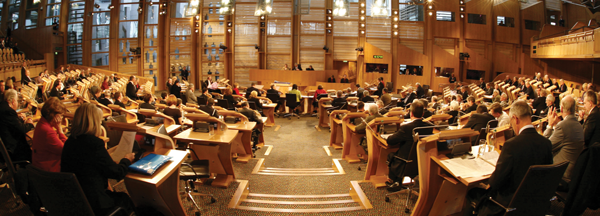Scotland’s fiscal future
Westminster is moving ahead with plans to give Scotland more financial powers, but holding back on full autonomy.
Two years from now, Scotland’s constitutional future will be decided by its voters with major potential repercussions for its neighbours. However, ongoing changes to its tax and spending will affect the future of the UK’s public finances, regardless of the referendum result.
The UK Government’s Scotland Act will devolve stamp duty and landfill tax to Holyrood (from April 2015) and establish a Scottish income tax rate (from April 2016).
Westminster would still set a minimum 10 per cent income tax rate but the Scottish Parliament would then raise that to its preferred figure, for both the basic and higher bands. Taken together, the tax changes will increase the proportion of Scottish spending raised in Scotland from 14 to 35 per cent.
Essentially, this will give Holyrood more power over its own budget (satisfying many Scots) and cut Westminster’s £26 billion block grant which, in turn, should please English tax-payers.
Under the Act, the Scottish Government will also be able to borrow up to £2.2 billion for capital spending in loans from either the UK Government or commercial banks. The power takes full effect in April 2015. A Treasury consultation on whether to let Scotland issue its own bonds started in June and ends on 14 September.
Opinion polls indicate that around 30-40 per cent of Scots back independence but 50-60 per cent would favour more devolution instead. Around 20 per cent prefer the status quo and 10 per cent would go back to direct rule.
Short of independence, the most radical option is full fiscal autonomy i.e. abolishing the block grant, and making Scotland pay its way. The Scottish Government would also make a contribution towards UK-wide public services such as the armed forces.
This move, effectively creating a federal union, is supported by John Major. “Why not devolve all responsibilities except foreign policy, defence and management of the economy?” he said in July 2011. While Major once opposed any devolution, he now thinks that federalism would “confront the argument head on” and cancel out most of the SNP’s grievances about Westminster.
Many unionists, though, fear that full autonomy would weaken the union and cut the Scottish budget. “If you break up the fiscal union,” Gordon Brown warned in August, “then it’s clear that you will either have to cut public expenditure massively beyond what is being done at the moment, or you will have to tax Scottish people more.”
David Cameron says that he is prepared to discuss extra powers, if voters reject independence. The SNP is willing to include a referendum question on fiscal autonomy, partly to divide unionism and partly to give nationalists a potential ‘stepping stone’ to independence.
The UK Government remains sceptical on devolving corporation tax to Scotland and BBC journalist Jim Fitzpatrick has suggested that the Liberal Democrats could unravel any prospect of devolution.
The Lib Dems hold just five seats at Holyrood and would face intense criticism from the SNP if it agreed to grant that power to Northern Ireland, but not Scotland. Clearly, this is a likely factor in the thinking of Danny Alexander: the MP for Inverness and Chief Secretary to the Treasury.






